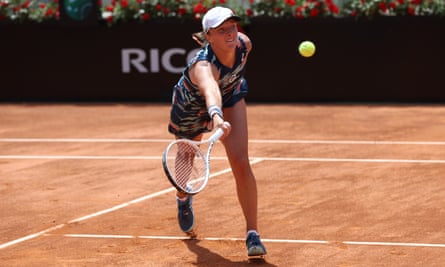If there were any lingering doubts about Novak Djokovic’s form as the French Open approaches, he has methodically addressed them with his racket over the course of the past week. In the Italian Open final on Sunday, he first soared and then efficiently dealt with adversity before defeating Stefanos Tsitsipas 6-0, 7-6 (5).
After clinching his 1,000th career victory on Saturday, Djokovic has now won a record-extending 38 Masters 1000 titles and six Italian Open titles in 12 finals. It was his first title since the Paris Masters in November after barely playing in the first three months of the year and being deported from Australia because of his decision not to take a Covid vaccination. Djokovic defeated top-10 players in three consecutive matches in Rome and Tsitsipas, ranked fifth, is his biggest scalp of the year.
Djokovic came out of the blocks on fire, serving well, relentlessly landing deep returns and controlling the majority of exchanges as he timed his forehand sweetly and refused to offer any free points. Tsitsipas, however, despite having won more matches and points than any other player on clay this year, was dire.
After relinquishing the opening set the Greek opened the second with improved serving and the rest of his game followed as he broke serve before establishing a 5-2 lead. Djokovic’s efficient response underlined the renewed confidence and trust he has in his game. As he neutralised Tsitsipas’s serve, served well and rose to the tight moments, he broke back and then narrowly inched ahead in the tie-break before seeing out his first match point.
There are even greater potential meetings ahead, particularly with the notable absence of Carlos Alcaraz in Rome and uncertainty surrounding Rafael Nadal’s foot. Questions also remain over Djokovic’s stamina in the potentially gruelling best-of-five-set matches to come.
But what is clear from this week in Rome is that he has slowly swept away the cobwebs in his game and is peaking right at the perfect time. Djokovic will now look forward to achieving one of the few remaining firsts in his career: he will try to defend a French Open title for the first time.
In the women’s event Iga Swiatek breezed past opponents while rarely coming close to dropping a set but for much of her week in Rome was not entirely satisfied with her performances. She felt her level was too up-and-down, that she was still adjusting to the clay and still had not entirely imposed herself on opponents from start to finish.

Although her standards are stratospheric, Swiatek is so good that she mostly matches them. She produced another dominant performance on Sunday, dismantling Ons Jabeur 6-2, 6-2 to defend her title and extend her winning run to 28 successive matches, with five titles in a row.
Swiatek had started the season with only three titles in her entire career, yet after four and a half months she heads to the French Open with eight and counting. She has dropped one set since March.
This was a contest between the two outstanding performers on clay this season, with Jabeur herself compiling a career-best 11 consecutive wins as she unlocked yet another historic achievement by becoming the first Arab and North African player to win a WTA 1000 title – last week in Madrid. While she has unsurprisingly been exhausted after the quick turnaround, she continually found a way through, recovering from a 1-6, 2-5 deficit against Maria Sakkari in the quarter-final and then saving a match point against Daria Kasatkina in her semi-final.
Such is Swiatek’s level, however, that her opponents must be in pristine condition and at the height of their powers just to be competitive.
Quick GuideHow do I sign up for sport breaking news alerts?
Show
- Download the Guardian app from the iOS App Store on iPhone or the Google Play store on Android by searching for 'The Guardian'.
- If you already have the Guardian app, make sure you’re on the most recent version.
- In the Guardian app, tap the Menu button at the bottom right, then go to Settings (the gear icon), then Notifications.
- Turn on sport notifications.
Swiatek imposed herself immediately, smothering Jabeur with her ultra-aggressive return. She dominated on the baseline, obliterating would-be forehand winners and easily dragging Jabeur off the court with angles while her defence was supreme. When Jabeur hit a purple patch and pulled herself back into the second set, Swiatek escaped four break points at 4-2 with a string of outlandish defensive points before sauntering to victory.
Swiatek’s 28-match run began on 22 February and, in the three months since, the gap between herself and the field has only grown. The 2020 French Open champion will return to Paris as heavily favoured there as any woman player has been in years.

Comments (…)
Sign in or create your Guardian account to join the discussion